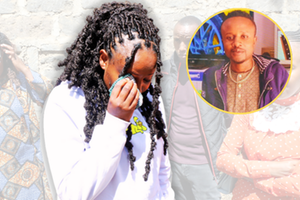
A nurse draws Covid-19 vaccine from a vial at Kencom Bus Station in December 2021. A new study has disproved infertility claims stemming from anti-vaxxers. It confirms there is no harm in being vaccinated as one can still conceive.
| File | Nation Media GroupNews
Premium
No evidence Covid-19 vaccines hurt fertility, latest research shows
What you need to know:
- The study shows that men are likely to get erectile dysfunction should they be infected with the virus.
- The research was conducted among people who were planning to have children just before they took the vaccine.
John Mwanza is still hesitant to take the Covid-19 vaccine because of information he stumbled upon online about the jab causing infertility.
He believes he may not have children if he gets inoculated and has avoided the vaccines, but observes health protocols to avoid being infected.
“I won’t take the jab until I am convinced it won’t hinder me from getting children. Until then, I will continue putting on masks, sanitising, observing social distancing and avoiding crowds,” he told the Nation yesterday.
However, a new study published by the American journal of Epidemiology seeks to give Mr Mwanza hope that he can still be a father. The research has disproved the infertility claims stemming from anti-vaxxers. It confirms there is no harm in being vaccinated as one can still conceive.
The study shows that men are likely to get erectile dysfunction should they be infected with the virus, but there is no evidence that a vaccine can cause infertility.
“We found no adverse association between Covid-19 vaccination and fertility and a short-term decrease in fertility after male partner SARS-CoV-2 infection,” states the study.
The Ministry of Health has given guidelines on inoculating pregnant women, saying the benefits outweigh the risks of infection.
Planning to have children
The study states that the decline in fertility, especially in men who get Covid-19, could be as a result of immune response and inflammation in the testes and epididymis, which have been observed in some patients.
Fever, a common symptom for Covid-19, also plays a role in the decline in sperm count in males.
“Fever is a known determinant of impaired spermatogenesis, and effects on sperm concentration, motility, and morphology can persist for three to four months. Fever could explain our finding of an acute decline in fertility among men with recent SARS-CoV-2 infection. Although fever is also a side effect of vaccination, it is much less common than for infection,” states the study.
The research was conducted among people who were planning to have children just before they took the vaccine. It was also keen to establish the reason for change in the menstrual cycles and vaginal bleeding reported as anecdotes by different women and girls who have received the vaccine.
“An association between Covid-19 vaccination and menstrual irregularities could theoretically arise through mechanisms involving immunological influences on hormone levels or through immune cells in the lining of the uterus. Some previous vaccines have been associated with short-term menstrual changes, including the typhoid, hepatitis B, and human papilloma virus vaccines,” states the study.
The researchers say there are two possible sources of long-term effects of vaccination: Components of the vaccine and the immune response to inoculation.
Vaccine misinformation
“Components of the vaccine have documented safety profiles, and any potential allergic reactions attributable to vaccine ingredients would be observed within approximately 15-30 minutes of vaccination,” states the study.
“The innate (rapid, non-specific) phase of the immune response takes place over several days and triggers the adaptive phase (slower, highly specific), which occurs over several weeks. Beyond this point, antibody concentrations slowly decline, and the risk of severe immunisation-related complications drops dramatically.”
The Journal of Osteopathic Medicine last year published a research based on the trends of Google in the United States, which showed that queries relating to vaccines and infertility had increased by 34,900 per cent after a well-known scientist sent a petition to the European Medicines Agency (EMA) in regards to safety and efficacy of the Pfizer vaccine.
The main words used in the search at the time were “infertility”, “infertility and vaccine”, and “infertility” and “Covid vaccine”.
“Vaccine misinformation corresponded with increased internet searches for topics related to infertility. This in turn fuels dispelling misinformation and informing patients about the risks and benefits of vaccination may prevent unnecessary vaccine hesitancy or refusal, contributing to successful vaccination efforts,” states the Osteopathic Medicine research.
“These results can be used to guide informed decision-making around Covid-19 vaccination among reproductive aged individuals, particularly those who are trying to conceive now or in the future,” states the study.





